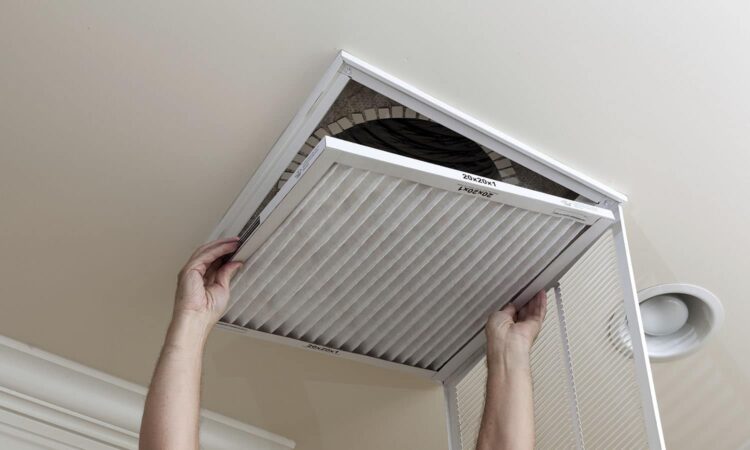
The HVAC system keeps the indoor environment cool by circulating air. The hot air from the room is sucked through the air filters. It passes across the refrigerant and cools. The cool air is released and hot air is sucked. In this air circulation process, the HVAC air filters or mesh traps and removes airborne particles, pollutants, and contaminants. The air filter can capture various types of particles such as dust, pollen, pet dander, mold spores, and bacteria.
It is a simple mesh, but a crucial component that helps in maintaining indoor air quality. Besides, it also prevents the buildup of pollutants in the HVAC system. A clean air filter can –
- Improve the system’s efficiency
- Reduce energy consumption
- Extend the lifespan of the equipment
There are different types of air filters used in Heating and air conditioning systems. Each type provides different filtration and efficiency levels.
Some common types of AC air filters
- Fiberglass Filters: These filters are designed from layered fiberglass. It is low-cost and disposable. The drawback is they are relatively less effective at capturing smaller particles but can help with larger dust and debris.
- Pleated Filters: Pleated filters have an accordion-like design, so the surface area is more. You get to choose from cotton paper and polyester material. They are more efficient than fiberglass filters and can capture smaller particles.
- High-Efficiency Particulate Air (HEPA)Filters: HEPA filters can capture particles as small as 0.3 microns with an efficiency of 99.97%. An environment that requires exceptional air quality like hospitals and cleanrooms chooses this filter type.
- Electrostatic Filters:Electrostatic filters use static electricity to attract and capture particles. You get to choose from two options – washable or disposable. However, it is an option that is more effective than fiberglass filters.
- Activated Carbon Filters: Activated carbon efficiently removes odors, volatile organic compounds (VOCs), and some chemicals from the air. You can use these in combination with other filters to control room odor.
- UV-C Filters: These filters use ultraviolet [UV] light to kill or neutralize airborne microorganisms [bacteria and viruses]. They are usually used along with other filters to enhance home air quality.
Choosing the right air filter for your HVAC system is essential to ensure optimal unit performance and better air quality. While choosing an HVAC air filter type consider the –
- MERV rating
- Type of filter material
- Size of the filter
- Frequency of replacement
- Efficiency and budget.
HVAC filters need to be replaced or washed depending on the type you chose. The frequency of replacement depends on factors such as –
- The type of filter
- The HVAC system’s usage
- The level of air pollution
- The manufacturer’s recommendations.
Simple filters like fiberglass and pleated filters are often easy to replace and can be done by homeowners. However, for more complex filters or systems, it may be best to hire a professional HVAC technician. For example, HEPA filters and certain electrostatic filters may require specialized handling or installation. Additionally, some HVAC systems may be located in hard-to-reach areas, making DIY replacement challenging.
While homeowners in Ohio can change basic air filters, it is advisable to consult a professional like Fry Heating & Cooling Services for more complex systems and filter types. The AC repair team will ensure proper installation and maintenance. Regularly replacing air filters is crucial for the efficient operation of your HVAC system and the overall air quality in your home or workplace.


